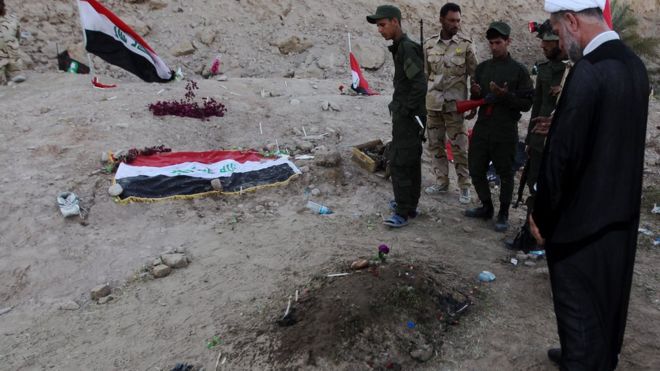Iraq has sentenced 40 captured members of ISIS to death on Thursday for the 2014 massacre of military cadets in northern Iraq, a judicial spokesman said. At least 1,566 mostly Shia cadets are assumed to have been killed in the massacre near former US Army base Camp Speicher.
Iraq’s judiciary said in a statement that the central criminal court in Baghdad had found 40 of the 47 defendants accused of taking part in the massacre guilty, reported AFP.
Many of those sentenced were appealing against earlier rulings.
The slaughter of the soldiers, which is a symbol of ISIS’s brutality, took place after they were captured when ISIS (Daesh) seized Saddam Hussein’s home town of Tikrit in June 2014. In the wake of the massacre, ISIS published propaganda videos showing recruits dressed in civilian clothing being forced to lie on the ground and sprayed with bullets by militants.
A Baghdad criminal court issued the death sentences according to what Abdul-Sattar al-Birqdar, spokesman for Iraq’s Supreme Judicial Council, said were convictions on terrorism charges. Seven defendants were acquitted and freed for lack of evidence.
Security forces arrested dozens of suspects over the mass killing of the soldiers after retaking Tikrit from ISIS last year. Judicial officials said that 24 were convicted and sentenced to death last July and that approximately 604 militants were believed to have taken part in the massacre at large.
London-based rights watchdog Amnesty International criticized the trial leading to the death penalties, saying it was “fundamentally flawed” and had exhibited “a reckless disregard for justice and human life”.
Amnesty said the total number of death penalties in Iraq so far this year had risen to almost 100.
However, Birqdar said that all death sentences were subject to review by the court of appeals. Iraqi law provides for an automatic appeal for all death-sentence and life-imprisonment cases, even if the defendants do not lodge an appeal themselves.
Death sentences in Iraq are often handed down after brief trials in which defendants are poorly represented, seldom allowed to give evidence and are often tortured into making confessions that are then used against them.

